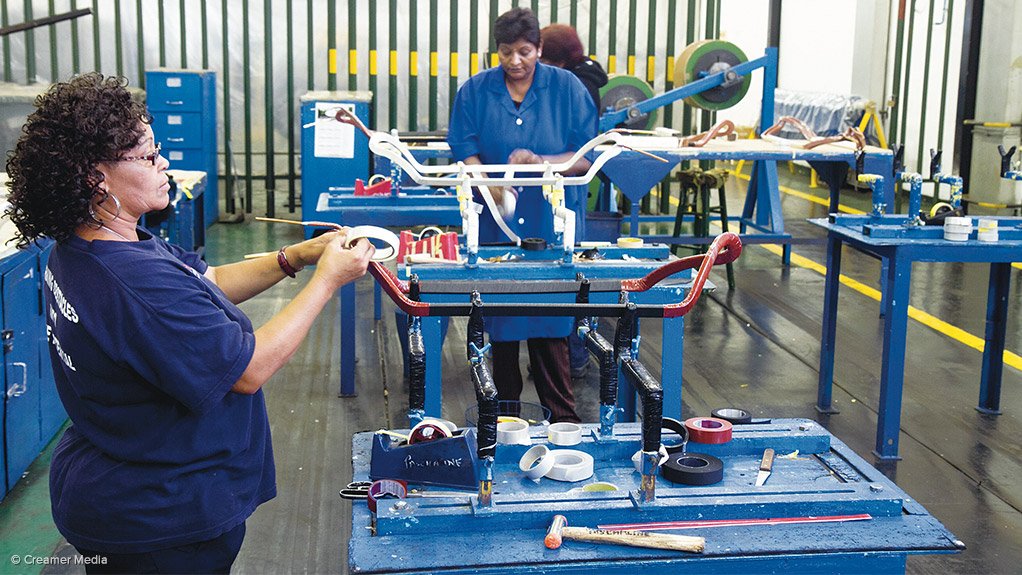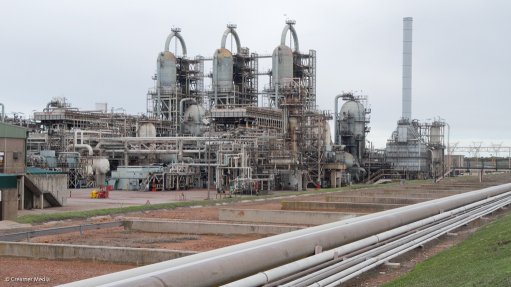DTI announces ‘tightening’ of manufacturing incentive scheme
Trade and Industry Minister Dr Rob Davies has approved the newly revised Manufacturing Competitiveness Enhancement Programme (MCEP) guidelines for implementation from April 1 in a bid to ‘tighten up’ the potentially imbalanced awarding of manufacturing support grants.
This followed consultation with various stakeholders last year, which the Department of Trade and Industry (DTI) said had “necessitated the amendments” of the current MCEP guidelines.
During these engagements, the DTI said it discovered that the highest percentage grant benefit of 61% was being awarded to larger enterprises while only 39% of the grant went to small and medium-sized enterprises.
“After this, it was decided that some ‘tightening measures’ were required so that the MCEP can support as many entities as possible,” the DTI said in a statement.
An analysis of the total grant approved also indicated that 4% of the total grant commitment went to small entities with assets below R5-million, while 10% went to those with assets between R5-million and R30-million.
Moreover, some 25% went to entities with assets between R30-million and R200-million and 61% went to entities with assets above R200-million.
Components and focus areas affected by the recent revision were the introduction of a total grant limit under capital investment, green technology, enterprise-level competitiveness improvement and resource efficiency, as well as cluster competitiveness improvement, which now had separate guidelines.
Elaborating on the amendments, incentive advisory firm Cova Advisory stated that the maximum benefit under the capital component of the MCEP had decreased from R50-million to R30-million, while the maximum benefit available under the green technology component of MCEP had narrowed from R50-million to R20-million.
Moreover, the maximum benefit available under the enterprise level competitiveness enhancement component had decreased from being only limited by the overall MCEP benefit ceiling to R2-million for applicants with a historic asset value below R5-million; R5-million for applicants with a historic asset value between R5-million and R200-million; and R10-million for applicants with a historic asset value of R200-million and above.
“This is a significant reduction from the previous benefit available under this component,” commented Cova Advisory MD Duane Newman.
In addition, the definition of qualifying costs for skills development had been narrowed and now excluded training-related costs for marketing, financial, human resources and information technology-related training costs.
Qualifying training-related costs, Newman explained, would only include training related to production development, product and quality management, skills directly related to manufacturing and/or engineering services and conformity assessment services.
Furthermore, clarification had been provided with respect to registration requirements, bonus grants and the inclusion of manufacturers in the private-sector defence industry.
Entities manufacturing tobacco products would not be eligible for the MCEP incentive, while entities in which a development finance institution had a majority shareholding would only be supported on a case-by-case basis and only if an exit strategy was provided, Newman pointed out.
He said a specific provision had also been inserted to ensure that activities or assets that had benefitted under other DTI programmes would not qualify for the MCEP.
Over and above these amendments, the broad-based black economic-empowerment (BBBEE) requirement of the MCEP had been amended to align with BBBEE policy to ensure that applicants met this requirement within a period of three years since the launch of the MCEP.
Prior to their revision, the MCEP guidelines had been reviewed in July 2012 following various consultations, which resulted in the relaxation of minimum requirements on capital investments and provided a clearer definition of total assets.
Further comments and inputs were received and a third version of the guidelines was published in November 2012.
The MCEP had been implemented by the DTI since June 4, 2012, and, as at March 31, 524 applications were approved with over R4-billion committed to support manufacturers and sustain over 100 000 jobs.
Comments
Press Office
Announcements
What's On
Subscribe to improve your user experience...
Option 1 (equivalent of R125 a month):
Receive a weekly copy of Creamer Media's Engineering News & Mining Weekly magazine
(print copy for those in South Africa and e-magazine for those outside of South Africa)
Receive daily email newsletters
Access to full search results
Access archive of magazine back copies
Access to Projects in Progress
Access to ONE Research Report of your choice in PDF format
Option 2 (equivalent of R375 a month):
All benefits from Option 1
PLUS
Access to Creamer Media's Research Channel Africa for ALL Research Reports, in PDF format, on various industrial and mining sectors
including Electricity; Water; Energy Transition; Hydrogen; Roads, Rail and Ports; Coal; Gold; Platinum; Battery Metals; etc.
Already a subscriber?
Forgotten your password?
Receive weekly copy of Creamer Media's Engineering News & Mining Weekly magazine (print copy for those in South Africa and e-magazine for those outside of South Africa)
➕
Recieve daily email newsletters
➕
Access to full search results
➕
Access archive of magazine back copies
➕
Access to Projects in Progress
➕
Access to ONE Research Report of your choice in PDF format
RESEARCH CHANNEL AFRICA
R4500 (equivalent of R375 a month)
SUBSCRIBEAll benefits from Option 1
➕
Access to Creamer Media's Research Channel Africa for ALL Research Reports on various industrial and mining sectors, in PDF format, including on:
Electricity
➕
Water
➕
Energy Transition
➕
Hydrogen
➕
Roads, Rail and Ports
➕
Coal
➕
Gold
➕
Platinum
➕
Battery Metals
➕
etc.
Receive all benefits from Option 1 or Option 2 delivered to numerous people at your company
➕
Multiple User names and Passwords for simultaneous log-ins
➕
Intranet integration access to all in your organisation





















